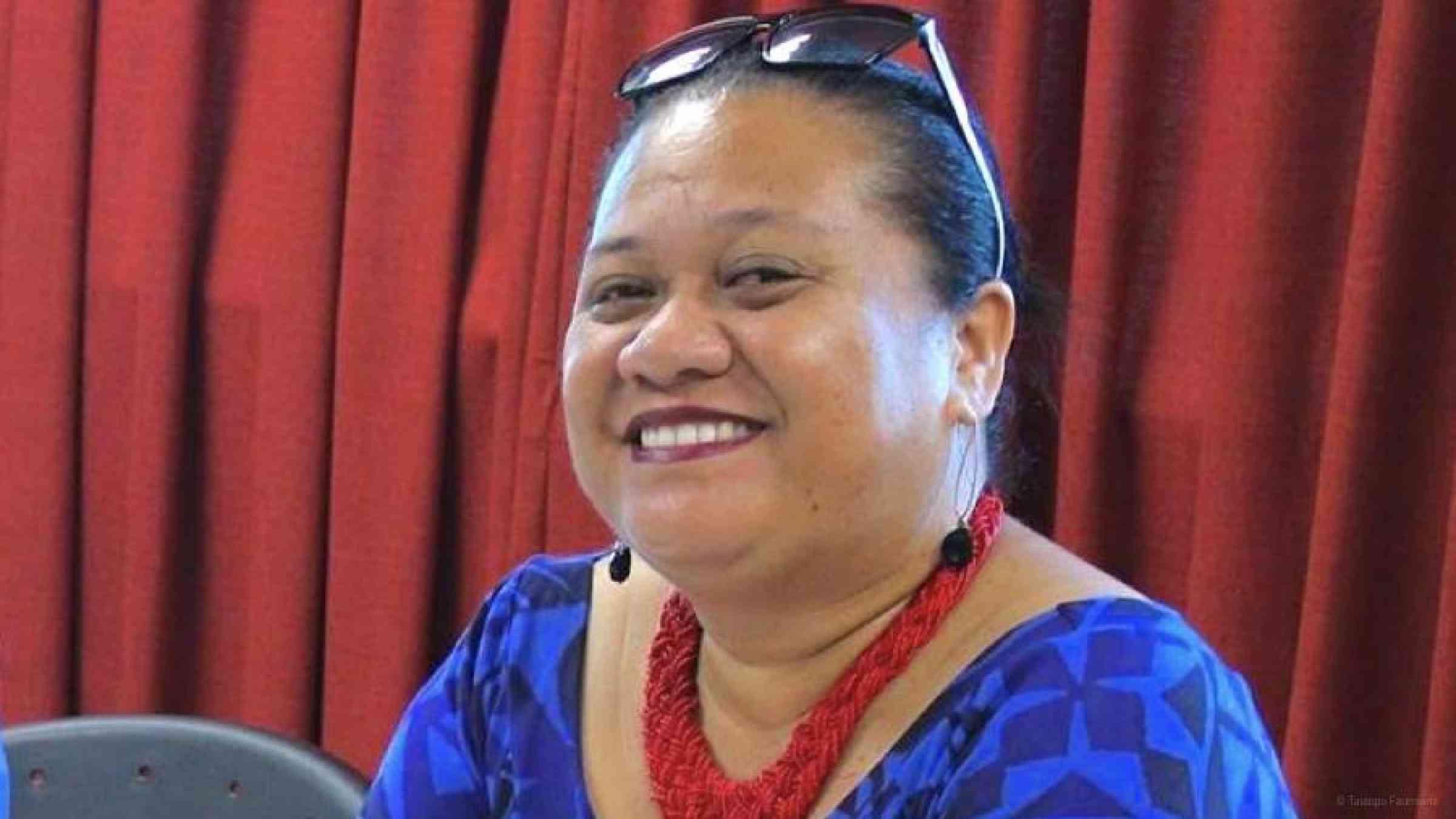Please help us improve PreventionWeb by taking this brief survey. Your input will allow us to better serve the needs of the DRR community.
Counting Women in Samoa to make the case for gender equality

Taiaopo Faumuina
"We have to make sure that after we collect the data, we discuss, share with the users and try to get more understanding of how to use and interpret this data.”
“We are involved in the data collection after disasters,” Taiaopo says. “We call it the ‘Initial Data Assessment Process.’ It is important to collect demographic information from the people, so policy makers and planners know who is affected and who is in need following a disaster.”
Taiaopo Faumuina is the Assistant Chief Executive Officer at the Samoa Bureau of Statistics in the division of Census, Survey and Demography. She says the process of developing the Initial Data Assessment was done in close consultation with partners.
“We started the form using our usual process of data collection then tried to include some requirements from the Sendai Framework,” she says. “The idea was to design an adapted form for Samoa and share it with our partners, especially those working with the Disaster Management Office so that it captures the information they need most.”
Taiaopo says the form has been used in multiple disasters in recent years and the process is now digital with tablets in the hands of her team and community partners to streamline the collection process.
“We already used the tablets before the latest Demographic Health Survey,” she says. “The upcoming census will also use tablets, but we use paper as a ‘Plan B’ when the batteries are off or if there are issues with the internet connection.”
“We had started with using the Computer Assisted Personal Interview (CAPI) method in our latest Samoa Demographic and Health Survey integrated with the Multiple Indicator Cluster Survey 2019-20 (SDHS-MICS),” she says. “The upcoming census will also use tablets, but we use Paper and Pen Interview Method (PAPI) as a ‘Plan B’ when the batteries are off or if there are issues with the internet connection.”
She says the data helps decision-makers better understand the needs and make the case for gender equality.

ChameleonsEye/Shutterstock
“Data speaks louder than just words,” says Taiaopo. “Our leaders use the data that we share to support their arguments about women and increase in the number of women participating in leadership.”
Taiaopo and her team have completed the Demographic Health Survey (SDHS-MICS 2019-20) and she is eager to publish the results. She says more training is needed so everyone understands and applies the data they gather.
“More data interpretation workshops with our partners are necessary,” she says. “We have to make sure that after we collect the data, we discuss, share with the users and try to get more understanding of how to use and interpret this data.”
While greater collaboration with interpretation is planned, community members do not always see the value of data collection.
“People ask what the use of this data is,” she says. “We try our best to explain the importance of data to support their village and districts plans especially in requirements from donors when they are proposed for funds for some of their projects.”
Taiaopo says a recent collaboration with the Ministry of Environment will shape the map of the climate action priority landscape for future development projects.
“We did the verification of water tanks and gathered data so that they could do reports for donors,” she says. “The Ministry now knows which areas need water tanks and then they will distribute based on the data.”
While this information helps illuminate parts of the water-needs map; she says limitations around gender definition in the census leave members of the Fa'afafine community feeling overlooked.
“It is stipulated under the Statistics Act 2015, that we have to collect only two types of sex, male and female,” she says. “Members of the Fa'afafine Association are trying their best to include other gender type in the upcoming census so that no one is left behind.”
Join the Women’s International Network on Disaster Risk Reduction by clicking here.
Twitter: https://twitter.com/WIN_DRR
LinkedIn: https://www.linkedin.com/groups/13945120/
The Women's International Network on Disaster Risk Reduction (WIN DRR) is a professional network to support women working in disaster risk reduction, in all their diversity. WIN DRR promotes and supports women's leadership in disaster risk reduction across the Asia Pacific region, and aims to reduce the barriers faced by women and empower them to attain leadership and enhance their decision-making in disaster risk reduction. WIN DRR is supported by UNDRR and the Government of Australia.
Taiaopo Faumuina is the Assistant Chief Executive Officer at the Samoa Bureau of Statistics in the division of Census, Survey and Demography.
Explore further
Please note: Content is displayed as last posted by a PreventionWeb community member or editor. The views expressed therein are not necessarily those of UNDRR, PreventionWeb, or its sponsors. See our terms of use
Is this page useful?
Yes No Report an issue on this pageThank you. If you have 2 minutes, we would benefit from additional feedback (link opens in a new window).